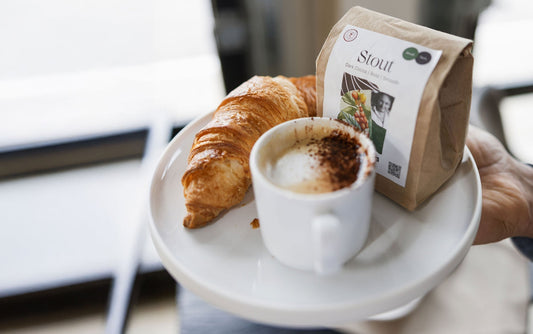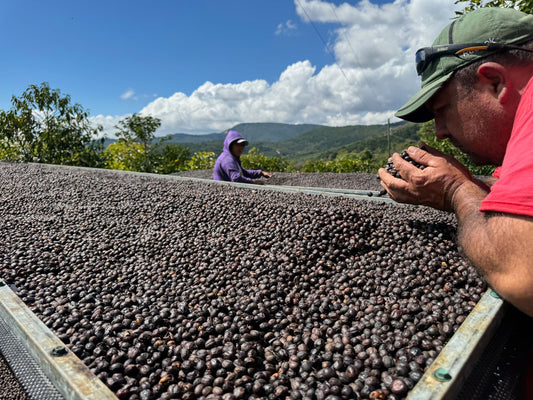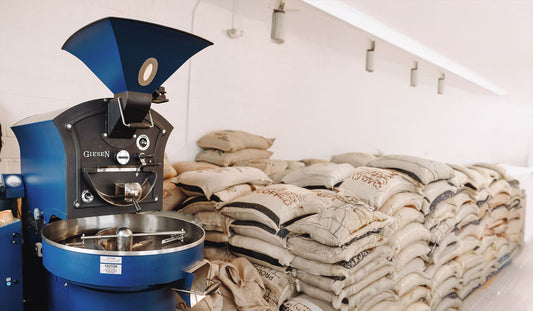Enter the concept of Fourth Wave Coffee, a term gaining traction in the specialty coffee movement - but not without friction.

This isn’t about new brewing gadgets or café design trends.
The fourth wave is a reaction. A reckoning. It’s where coffee professionals and drinkers alike start asking harder questions about ethical coffee sourcing, coffee supply chain reform, and livable wages in coffee, and start demanding actual answers.
It’s not for Instagram. It’s for impact.
TL;DRWhat Is Fourth Wave Coffee? (Definition) Fourth Wave Coffee is a movement within the specialty coffee industry that shifts focus from flavor and origin (hallmarks of Third Wave) to ethical, transparent, and science-based reform across the entire supply chain. It emphasizes livable wages, ownership equity, climate resilience, and traceable sourcing. |
Fourth Wave Coffee is a movement within the specialty coffee industry that shifts focus from flavor and origin (hallmarks of Third Wave) to ethical, transparent, and science-based reform across the entire supply chain.
It emphasizes livable wages, ownership equity, climate resilience, and traceable sourcing.
It means rethinking the entire value chain: forging more direct trade partnerships, building climate-adaptive sourcing models, improving pricing transparency, and using technology in coffee production to drive real outcomes - not just aesthetic improvements.
Think: less gatekeeping, more accountability. Less “single origin” storytelling, more system-level reform.
A Deeper Look: From First to Third Wave Coffee
To understand what the Fourth Wave stands for, it helps to trace how we got here.

First Wave: Coffee as Commodity
The First Wave was all about accessibility and mass production, vacuum-sealed cans, instant granules, and low-cost blends. Think Folgers and Maxwell House. Coffee was treated purely as a commodity crop, disconnected from its origins or its environmental impact.
This wave built the infrastructure and normalized everyday coffee consumption across the Global North, but also entrenched the extractive economics that still plague the industry today.
Second Wave: Coffee as Lifestyle
The Second Wave introduced espresso drinks, branding, and café culture, led by chains like Starbucks and Peet’s. Coffee became a product of consumer experience, not just consumption.
But while the ambiance evolved, sourcing practices stayed opaque. Producer livelihoods, environmental impact, and traceable trade? Still invisible to most.
Third Wave: Coffee as Craft
The Third Wave was a major step forward, bringing attention to origin, processing, and quality. It was the rise of manual brewing methods, single-origin coffee, and direct trade models (though often unregulated in practice).
Flavor clarity and terroir became part of the conversation. But many of the same structural inequities persisted. Fair pricing, climate resilience, and worker protections were still treated as optional - not essential.
What Is the Fourth Wave of Coffee?
The Fourth Wave Coffee Movement is a radical evolution in how we value, produce, and purchase coffee.
It asks:
-
Was the farmer paid a living wage, based on local cost of production, not Western feel-good standards?
-
Did your $25 bag account for climate adaptation, gender equity, or carbon emissions?
-
Are your baristas earning a fair wage, with access to health care or advancement?
-
Is “quality” being measured by sensory evaluation and lab data, or by aesthetics and marketing?
This isn’t about fetishizing coffee. It’s about professionalizing the coffee value chain, with traceability, fairness, and sustainability built into the model.
Core Principles of Fourth Wave Coffee
1. Radical Transparency
No more vague claims like “ethically sourced” without proof. Fourth Wave means:
-
Public pricing reports
-
Shared farmgate and FOB data
-
Traceable contracts
-
Open books on markups
It’s about replacing vague sourcing language with real accountability. If you can’t trace the trade, it isn’t transparent.
2. Scientific and Technological Rigor
The Fourth Wave brings in data-driven coffee production tools, like moisture meters, near-infrared analysis, crop forecasting, and water activity profiling.
We’re not anti-science. Coffee is better because of science, whether in roasting precision, post-harvest fermentation techniques, or sustainable packaging innovation.
3. Real Sustainability
Sustainability isn’t a biodegradable straw. It’s structural.
The Fourth Wave demands:
- Agroforestry and regenerative agriculture
-
Transparent carbon offsetting programs
-
Farming practices that prevent biodiversity loss
-
Acknowledgment of coffee’s role in deforestation - and plans to fix it
(If you care about this, check out our piece on the impact of climate change on coffee production).
4. Economic Equity
Equity doesn’t mean throwing an extra dollar at the problem. It means questioning how we define value in coffee and who benefits.
The Specialty Coffee Transaction Guide gives us real-world benchmarks for transparent green coffee pricing, backed by actual contracts, not PR copy.
Producers, baristas, roasters - we all need to be part of a fairer pricing system that reflects the true cost of sustainable coffee production.
5. Ownership and Power: Who’s Really in Control?
As a specialty coffee roastery, we’re part of a system that still rewards those with capital and control. That includes us.
But if the Fourth Wave is about systemic change, we have to look at who owns what—not just who gets mentioned in the story.
We’re talking about:
-
Producer-owned cooperatives
-
Exporter equity
-
Barista profit-sharing
-
Shared roasting and retail infrastructure
This isn’t about handouts. It’s about rewriting the value chain to include ownership, not just access.
6. Consumer Education with Context

The Fourth Wave invites consumers into the complexity. It’s not just about tasting “papaya” in a washed Ethiopia, it’s about understanding why that flavor exists, and how climate volatility threatens it.
This means more than origin blurbs. It means transparent storytelling, contextual education, and ethical buying decisions rooted in systems thinking.
Is It Just Another Label?
Maybe. But maybe it’s finally the right label for the work a lot of us have already started doing.
Critics say the industry doesn’t need more segmentation. Maybe they’re right. But it definitely needs more accountability, clarity, and honesty about its economic structures.
The Fourth Wave isn’t about chasing trends. It’s about building resilience and ensuring coffee’s future isn’t built on exploitation.
Why Should You Care?
Because if you’re drinking coffee in the Global North, someone in the Global South probably did the hardest work for the smallest return.
Because if you’re sourcing beans, opening a café, or working behind a bar, you’re part of this system, and you have the power to push it forward.
Because if this industry doesn’t course-correct, it may not survive the next 30 years of climate risk, labor shortages, and economic instability.
FAQ: What the Industry Isn’t Talking About (But Should Be)
Is Fourth Wave Coffee just a new way for brands to charge more?
No. If all you're doing is raising your prices without changing your sourcing model, your supply chain transparency, or your labor practices - then yes, it's just price inflation with a buzzword. But true Fourth Wave coffee isn’t about premium pricing.
It’s about redefining what “value” actually includes: fair wages, long-term sustainability, climate resilience, and shared ownership.
If you’re charging more, you’d better be paying more - to the right people.
Why aren't more cafes and roasters adopting Fourth Wave practices?
Because it’s harder. It requires reworking sourcing relationships, renegotiating contracts, and being transparent about margins.
It also means potentially earning less in the short term to build something more ethical long-term.
Many businesses either don’t want to - or can’t - make those moves under their current model. But let’s be clear: comfort is no excuse for complicity.
Does being “small batch” or “local” automatically mean it’s ethical coffee?
No. We’re a small roastery ourselves, and we’ll be the first to admit: small doesn’t equal ethical.
A lot of small roasteries still rely on exploitative systems, they just brand around them better.
Ethical sourcing takes real work: transparency, relationship-building, price accountability, and a willingness to confront power imbalances.
What’s stopping producers from roasting and selling their own coffee?
Infrastructure. Access to credit. Trade barriers. Gatekeeping.
A global system designed to keep producers at the bottom of the value chain.
Yes, some producers are roasting and exporting under their own brands - and it’s happening more - but they're the exception, not the rule.
We need to ask ourselves: Are we building a system that supports origin-led businesses, or just preserving one that depends on them staying dependent?
Is the Fourth Wave just for roasters and industry pros?
No. If you buy coffee, you’re already part of the system.
Whether you’re a barista, café regular, home brewer, or wholesale buyer, every decision you make reinforces (or challenges) the current model.
The Fourth Wave is for anyone who believes coffee can be more than just a product - it can be a platform for equity, transparency, and long-term survival.
Final Thoughts
The Fourth Wave isn’t coming. It’s already here. You’ll see it in:
-
Roasters sharing farmgate pricing and impact reports
-
Producers speaking directly to buyers and consumers
-
Baristas demanding career paths, not side gigs
-
Consumers asking tougher questions about where their coffee comes from
And more than anything, you’ll know it by this:
The best coffee won’t just taste good. It will do good.





